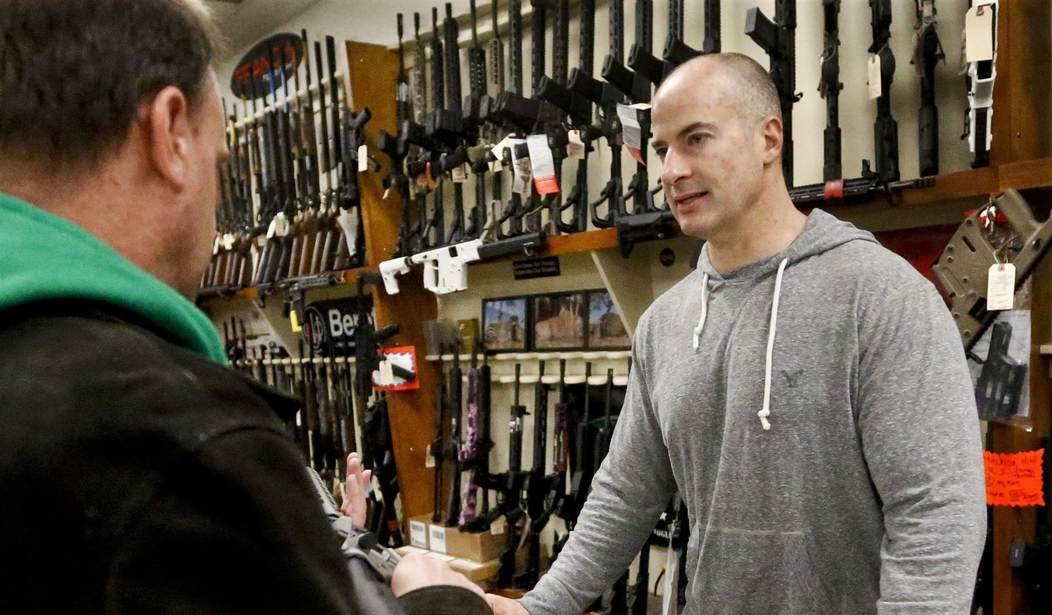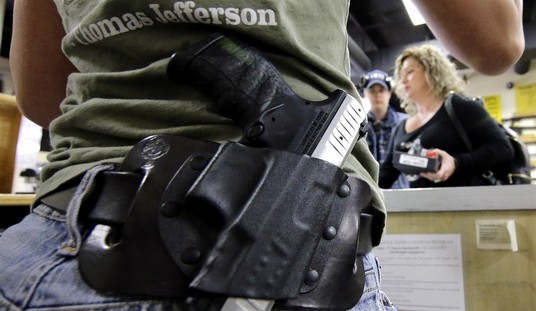Second Amendment advocates won a big victory on Monday as the Tenth Circuit Court of Appeals ruled that Colorado’s law forbidding gun sales to adults under the age of 21 cannot be enforced while the measure is being challenged in court, rejecting an appeal by Gov. Jared Polis, who was seeking to enforce the prohibition.
Back on August 7th, just a day before the new law was set to take effect, a federal judge issued a preliminary injunction requested by Rocky Mountain Gun Owners, but Polis quickly appealed that decision.
In their brief two-page order, appellate judges Carolyn McHugh and Nancy Moritz (both Obama appointees, incidentally) concluded that the governor had “failed to show his entitlement to a stay” under the factors necessary. Those factors include Polis establishing that “he is likely to succeed on the merits, that he is likely to suffer irreparable harm in the absence of preliminary relief, that the balance of equities tips in his favor, and that an injunction is in the public interest.”
It’s unclear from today’s order if Polis was able to satisfy any of those requirements in the eyes of the Tenth Circuit, but in issuing the preliminary injunction U.S. District Court Judge Phillip Brimmer concluded that the plaintiffs were likely to succeed in their lawsuit, that the deprivation of their Second Amendment rights did indeed cause them to suffer irreparable harm, the balance of equities was tipped in their favor, and that the injunction served the public interest by keeping the Second Amendment rights of young adults intact. Specifically, Brimmer found the state’s evidence for a historical basis for the prohibition to be severely lacking. Colorado attorneys had pointed to several ordinances that Brimmer concluded were not analogous to the state’s complete prohibition on gun sales for under-21s, while the few statutes that did bar adults younger than 21 from keeping or bearing arms were passed long after the Second Amendment took effect.
Without any confirmation in the form of founding era regulations, the Court does not consider three pre-Civil War regulations as strong evidence of the “public understanding of the right to keep and bear arms” at the time the Second Amendment was ratified.
Finally, the Governor identifies post-Civil War regulations that some states adopted by the early 20th century. The Governor represents that, by 1900, 18 states and the District of Columbia adopted laws regulating firearm sales to those under the age of 21 and that shortly thereafter 45 states had laws restricting the sale of firearms to minors. The Individual Plaintiffs argue that, of the 17 post-Civil War laws the Governor identifies, one did not prohibit the purchase of firearms, one is from a state that “operated under a fundamental misunderstanding of the right to bear arms,” one was from a Western state that should be disregarded as overly restrictive under Bruen, and that seven other laws were adopted by States with no Second Amendment analogue. The Individual Plaintiffs argue that the remaining seven laws are not appropriate analogues to SB23-169 because they rely on a status, namely, legal minority, that does not apply to 18-to-20 year olds today.
The Governor argues that the regulations he identifies burden the right to selfdefense in a similar way to SB23-169 in that they burden persons under a certain age from accessing weapons, mostly by limiting their ability to purchase weapons. Additionally, the Governor argues that the regulations were in place for the same reason that SB23-169 was passed, to protect public safety, despite the fact that such laws would burden the right to self-defense.
Bruen stated that the Court has “made clear that individual rights enumerated in the Bill of Rights and made applicable against the States through the Fourteenth Amendment have the same scope as against the Federal Government.” While it remains an open question as to how a court should weigh historical understandings of the Second Amendment at the time that the Fourteenth Amendment was adopted, because the Governor fails to point to any evidence during the founding era that a total prohibition on the sale of firearms to minors was consistent with the right to bear arms, the Court gives little weight to evidence from the time of the Fourteenth Amendment’s ratification to limit the scope of the right to keep and bear arms. The Court finds that the Governor has failed to meet his burden to demonstrate that SB23-169 is consistent with the Nation’s historical tradition of firearms regulation. For the purpose of obtaining a preliminary injunction, the Individual Plaintiffs have demonstrated a likelihood of success on the merits.
And now the Tenth Circuit agrees. The next step for Polis would be to take his emergency appeal to the Supreme Court and ask them to reinstate the ban, but I’d say there’s next to no chance of that happening. SCOTUS declined to intervene in granting an emergency injunction against New York’s post-Bruen carry restrictions and Illinois’ ban on so-called assault weapons and large capacity magazines, and even if I have my concerns about Chief Justice Roberts getting squishy on the Second Amendment, the Court is most likely going to do the same now that it’s anti-gunners asking for relief.
Today’s decision doesn’t guarantee that Colorado’s ban on gun sales to young adults will remain unenforced forevermore, but it’s a significant step in that direction, and congratulations are in order to RMGO and the individual plaintiffs in the case who are suing to regain the rights stripped from them by Colorado lawmakers and Polis himself.









Join the conversation as a VIP Member